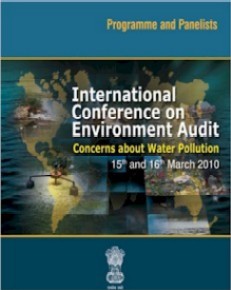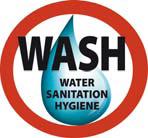/topics/urban-water
Urban Water
Manual on operation and maintenance of water supply systems - CPHEEO (MoUD)
Posted on 15 Sep, 2010 10:58 PMThis manual has been developed by the Central Public Health and Environmental Engineering Organisation (CPHEEO), a department under the Ministry of Urban Development (MoUD) and is intended primarily for the managers and technicians in-charge of the O & M of the urban drinking water supply systems.
The aim of the manual is to serve as a guide for strengthening the technical, operational and managerial capabilities required of the concerned personnel to operate and maintain water supply services as per acceptable norms of quantity, quality, sustainability, reliability and cost.
International conference on environment audit - Concerns about water pollution - CAG (2010)
Posted on 10 Sep, 2010 05:15 PM This link on the CAG website provides the details of an international conference that was held on 15-16 March 2010, in the backdrop of the environmental audit proposed by the the Comptroller and Auditor General (CAG) of India, for management and conservation of the environment .
This link on the CAG website provides the details of an international conference that was held on 15-16 March 2010, in the backdrop of the environmental audit proposed by the the Comptroller and Auditor General (CAG) of India, for management and conservation of the environment .
The purpose of this conference was to deliberate on the causes of pollution, action taken by governments and civil society to address this and environmental, management and legal interventions needed to put lakes, rivers and ground water on the path of sustainability.
More than 20 experts on water and water pollution issues were invited to share their views as panelists during the conference. Apart from these distinguished panelists, the heads of supreme audit institutions from countries like Austria, Maldives, Bangladesh and Bhutan were also present to share their experiences regarding audit of water pollution in their countries.
Rapid investigations to assess impacts of aquifer recharge - Tumkur district (Karnataka) - A report by ACWADAM and BIRD-K
Posted on 01 Sep, 2010 02:19 PMThis report by ACWADAM is a synopsis of the hydrogeological study carried out for BIRD-K in Pavagada, Sira and Bagepalli areas of Tumkur District, Karnataka. The study aimed at an impact analysis of recharge through borewells as well as suggesting new sites for the same.
The principle objectives of the study were:
- Impact analysis of aquifer recharge through borewells done by BIRD-K in Pavagada and Sira Clusters
- Suggest new sites for aquifer recharge through borewells in Bagepalli cluster.
The methodology used a background study of the area through images from Google Earth. A detailed geological fieldwork in the area was carried out. Various structural and hydrogeological measurements were made to map out the aquifer systems within the area. Water levels in borewells and dug wells were measured. The study area included seven watersheds and falls in two clusters namely Pavagada and Sira. Both these clusters are located in the Tumkur district of Karnataka.
Rainwater harvesting initiatives in Bangalore - A paper by KSCST
Posted on 29 Aug, 2010 12:10 AMThis paper by AR Shivakumar of the Karnataka State Council for Science and Technology (KSCST), presented at a national seminar organised by ISRO at NIAS Bangalore in 2010, begins by highlighting the increasing problem of scarcity of water that the city of Bangalore has been experiencing in recent years and suggests a required plan of action for a sustainable water supply system in the city.
Documentary film on "Water and a City", Voices from the Waters, Bangalore
Posted on 26 Aug, 2010 05:05 PM
Organizer: Voices from the Waters
Venue: Era Organic, #348, Dollars Colony, R.M.V Club Double Road. R.M.V. II Stage, Bangalore 560 094
The screening will be followed by an interaction with Film Maker Ms. Swathi Dandekar.
Floods, drinking water contamination, mining and waterbodies, water bills, water conflicts - News roundup (1-7 August 2010)
Posted on 07 Aug, 2010 04:51 PMFloods: lessons to be learnt from the massive flooding in Surat city
A report by IIM criticises the way in which dams are managed in the country and calls for the need to apply Management Science / Operations Research techniques and information technology to improve dam management and prevention of floods
Status of urban water supply, sanitation and solid waste management - CPHEEO data (2005)
Posted on 06 Aug, 2010 11:11 AMThis link on the Central Public Health and Environmental Engineering Organisation (CPHEEO) website, presents data related to the status of the urban water, sanitation and solid waste management in India. The data includes information on:
- Status of water supply (physical)
- Status of urban water supply (financial)
- Status of urban sewerage/sanitation system
- Status of low cost sanitation
- Status of solid waste management
Data is included from different states in India namely Assam, Arunachal Pradesh, Karnataka, Gujarat, Maharashtra, Mizoram, Pondicherry, Sikkim and Tamilnadu respectively.
India WASH forum e-newsletter - Update 13 July 2010
Posted on 02 Aug, 2010 11:56 AMWe see this newsletter as a platform for independent credible voice in the water and sanitation sector. Our emphasis is on bringing together critical news and information with analysis. In this issue we share news and analysis on topical issues and developments.
The Department of Drinking Water and Sanitation(DDWS) has simultaneously invited inputs to Discussion Papers on Drinking Water and Sanitation, circulated on Solution Exchange. Inputs given by India WASH Forum, on this, is enclosed in this Update. We have pointed out the missing elements of sanitation improvement strategy that include, criticality of providing water as an inseparable component to household sanitation, the tendency to see behavior change as a lifestyle issue and not linked to the hardware components, peoples livelihoods and living conditions. Suggestions for what needs to be done to strengthen the implementation mechanism of the flagship sanitation programme(TSC) and partnerships.
Decentralisation and water resources management in the Indian Himalayas: The contribution of new institutional theories - Conservation and Society paper
Posted on 02 Aug, 2010 01:31 AMThis paper discusses the relevance of the process of decentralisation in water resources management. The paper argues that decentralisation is not about formulating a top-down reform package to transfer power from central government to other actors to manage water resources, nor is it about emphasising the existence of the bottom up agency.
Rather, the paper draws on "New Institutionalism" and argues that decentralisation is a complex adaptive process that involves natural as well as political actions of actors and agents who draw on existing structures to negotiate and renegotiate the existing unequal power relations to manage water.






